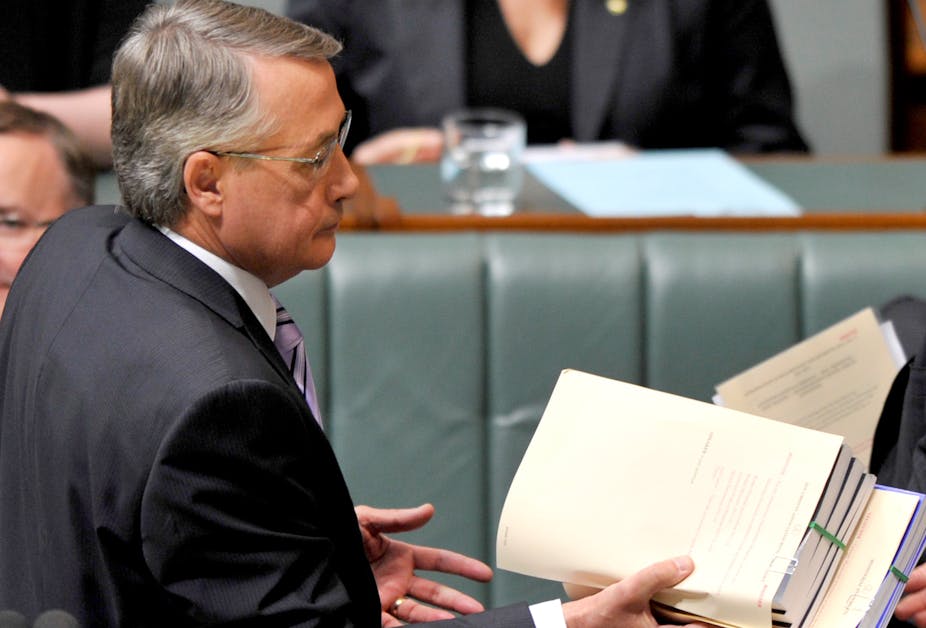Last night’s federal budget is a good time to analyse the government’s take on the economy and its economic policy agenda.
In this budget, the Treasurer is cautiously upbeat about Australia’s medium term economic prospects. And so he should be. We are certainly headed for another economic boom, one which might last many years.
We are in the right place, near to Asia, at the right time, when across Asia and particularly in China and India, economic growth is bounding along.
This is a wonderful opportunity to cement in long term prosperity for Australia and its people. But it will take action and courage, only a small and inadequate bit of which we see in this year’s budget.
What is required? Our immediate source of wealth is in the minerals and energy sectors. Thus the wealth generated from these sectors should, in part, be available for the nation as a whole.
Sure, hard work and risks taken should be adequately rewarded to ensure that these sectors prosper and grow. But the rewards should be adequate, not excessive.
I live in Perth and when I walk along the Swan River, I see crowded pens full of very expensive boats, many with million dollar plus price tags.
It is not for me to question how people spend their money, but I do have the nagging feeling that this is not the best way for the nation to reap the benefits of booming minerals and energy projects.
First, before we deal with policy to reap these benefits, a very important point needs to be made about property rights in the minerals and energy sectors, because the sharing of the benefits of mining and energy developments depends critically on a clear understanding of who owns the resources mined and developed by these sectors.
Unambiguously, the minerals and energy resources in the ground are owned by the Australian people.
Thus the Australian people have the right to charge for these resources through the taxation system.
Government, on behalf of the Australian people, allocate exploration and production rights to the private sector in return for a resource tax or royalty payment.
But here lies a huge conundrum – who is it that acts on behalf of the Australian people? Is it the Federal government or the relevant State government?
This is a constitutional issue, but by dint of tradition ownership, and thus the right of taxation, is vested in the States.
Although there is a notable exception – parts of gas and oil, (offshore developments, but not including the North West shelf) are vested in the Commonwealth and since 1987 the Commonwealth has imposed and overseen the application of a resource rent tax in this sector.
Courage will require the Commonwealth to negotiate with the States the right to impose a sensible taxation scheme for minerals and energy.
What is required is for the nation to share in the huge profits being reaped by the minerals and energy sectors.
The government has already received good advice as to how this can be done.
The Secretary of the Treasury, Dr Ken Henry has overseen the preparation of a magnificent review of Australia’s taxation system.
In this report, the case is made for a resource rent tax that is both fair and efficient.
In what was a ham-fisted attempt to introduce such a tax, the government backed down in the face of enormous pressure from the vested interests involved, particularly the energy and mining sectors.
This displayed a complete lack of courage by the Gillard government.
The Minerals Resource Rent Tax (MMRT), otherwise known as the super profits tax, is the most efficient way of taxing mining and energy.
It was mostly invented by Australian economists and is a fiendishly clever way of ensuring that exploration and development is not taxed (and therefore impeded) while at the same time ensuring that supernormal profits are taxed in the national interest.
What are supernormal profits? They are the profits that are earned on resources above and beyond what is needed to ensure that production and development is unimpeded.
In the language of economists, this means that the tax is neutral in its effects on production and development.
The capacity of the government to reap such a tax only requires the courage to do so.
In the budget the Treasurer has outlined a very super-lite version of the tax, restricting its scope and watering down its content to allow very light taxation of a few minerals.
For example, gold which is currently trading at over $1500 dollars an ounce is omitted from the tax. This is a national scandal.
In next year’s budget, I hope that the government shows the necessary to courage to strengthen and broaden this tax in line with Dr Henry’s recommendations.

